
23,25 €
Science-based food supplements
Quantity:
Total:
Total products:
Total shipping: To be determined
Total:
Manufacturer: Kenay GmbH
In stock
| Quantity | Price | You Save |
|---|---|---|
| 2 | 27,91 € | Up to 2,33 € |
| 4 | 27,33 € | Up to 6,98 € |
By buying this product you can collect up to 29 loyalty points. Your cart will total 29 points that can be converted during next order into a voucher of 1,45 €.

TAXIFOLIN Dihydroquercetin
60 capsules
Item Catalog Number: K0680EN
Original product name: TAXIFOLIN Dihydroquercetin
Taxifolin (dihydroquercetin) is a molecular variant of the flavonoid quercetin, but much better absorbed than traditional quercetin. Taxifolin is a flavonoid compound found in food such as onions and olive oil, larch, camphor pine and water safflower.[1,3]
Benefits at a Glance:
The chemical structure of Taxifolin allows it to fight free radicals much more effectively than other flavonoids.[1,2]
Some research shows that taxifolin could be used to treat allergic and inflammatory conditions due to its anti-inflammatory properties.[1]
Taxifolin may be helpful in the prevention and treatment of cardiovascular disease. It protects the cardiovascular system by protecting the integrity of the endothelium of blood vessels.
In porcine coronary artery rings studies, showed Taxifolin's vasorelaxant effect.[4]
Taxifolin helps maintain the healthy lipid profile of the liver and lipid excretion at optimal levels. Taxifolin prevents hyperlipidemia by reducing the esterification of cellular cholesterol, phospholipid, and triacylglycerol synthesis.[1]
Taxifolin reverses acute alcohol-induced liver injury by alleviating oxidative stress injury. One of new study, for the first time shows, that Taxifolin can reduce alcoholic liver toxicity.[11]
By regulating the glutathione pathway, Taxifolin protects also against paracetamol-induced liver injury.[12]
There is growing evidence that taxifolin plays very important role in respiratory disease. Taxifolin shows as an effective treatment for acute lung injury. It inhibits inflammation caused by acute lung injury.[1,7]
Taxifolin has also been shown to encourage a healthy immune response, especially to seasonally changing environments.
The balance of bones is maintained by the interaction of osteoclast bone resorption and osteoblastic osteogenesis. Due to its anti-inflammatory properties, taxifolin plays important role in the regulation and balance of bone metabolism. Moreover, taxifolin alleviated bone loss caused by oophorectomy.[1,8]
In another in vitro study, taxifolin inhibited RANKL*-induced osteoclast differentiation in human bone marrow-derived macrophages (BMMs) without cytotoxicity. In a mouse calvarial osteolysis model in vivo, taxifolin also prevented bone loss as assessed.[1,9,10]
*RANKL (Receptor Activator for Nuclear Factor κ B Ligand - a protein involved in bone metabolism {osteoclast activation}, belonging to the family of tumor necrosis factors.)
Daily dose: 2 capsules
| Amount Per Day (2 capsules) | |
|---|---|
|
Taxifolin 92% (dihydroquercetin) |
100 mg |
|
Ingredients: bulking agent: microcrystalline cellulose, taxifolin (dihydroquercetin), capsule shell: hydroxypropyl methylcellulose. |
|
Vcaps® is a trademark of Lonza or its affiliates.
Dosage and Use
Take one (1) capsule two (2) times daily or as directed by your healthcare professional.
Warnings:
Before you start using any dietary supplement, consult your doctor.
Dietary supplements are not medicines.
Do not exceed the recommended daily dose.
Dietary supplements cannot be used as a substitute for a varied diet.
Do not use in case of hypersensitivity to any ingredient of the preparation.
The product should not be used by pregnant or breastfeeding women and children and adolescents under 18 years of age.